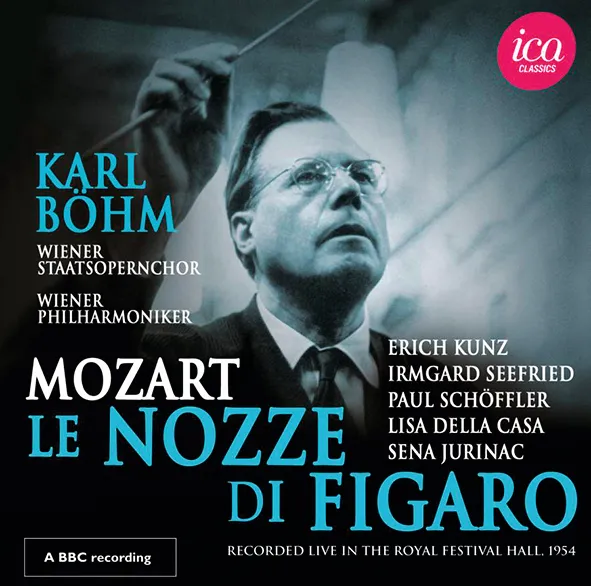
Mozart Le nozze di Figaro Irmgard Seefried, Sena Jurinac, Erich Kunz, Paul Schöffler, Lisa Della Casa, Rosette Anday, Oskar Czerwenka, Murray Dickie, Anny Felbermayer, Walter Berry; Vienna State Opera Choir; Vienna Philharmonic/Karl Böhm ICA Classics ICAC 5147 155:02 mins (2 discs)
This live recording was made in London’s Royal Festival Hall in 1954 – a period when the search was on by Karl Böhm and others (Fritz Busch, Vittorio Gui, Hans Rosbaud, etc.) for a new approach to Mozartian performance. The singers here are vocally pre-eminent and the performance is alert, theatrically motivated and (at times) moving. Moreover, this event shares some key performers with Böhm’s 1956 recording (available on the Guild Historical label) for the 200th anniversary of Mozart’s birth.
The sound quality here is of its time and clearly more care was taken to capture the voices than the orchestra. Despite Böhm’s efforts there is sometimes a struggle between the old portentous style of singing and the new comedic, ‘acting-with the-voice’ approach. Lisa Della Casa (Countess), for example, has superb vocal quality, but begins the reflective aria ‘Dove sono’ like an announcement from a deity. Sena Jurinac (Cherubino – she sings the Countess in Böhm’s 1956 recording), is sparkling, but renders the little canzonetta ‘Voi che sapete’ almost as if it were a Schubert song, with over-rich fluidity and narrative import. Irmgard Seefried’s Susanna is agile (hers must be the fastest ‘Aprite, presto’ duet ever recorded) and Eric Kunz’s Figaro has humour but perhaps misses his darker side (‘Se vuol ballare’). Only Paul Schöffler (the Count) seems past his best.
Böhm’s greatest recording of Figaro was probably his 1968 Berlin version on Deutsche Grammophon (with Hermann Prey and Edith Mathis). For recent revelatory performances try Teodor Currentzis on Sony Classical or René Jacobs on Harmonia Mundi.
Anthony Pryer